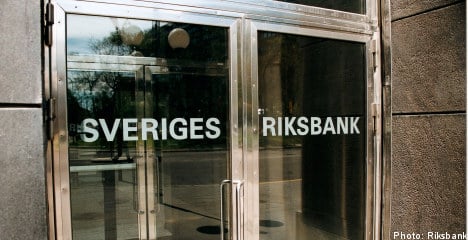“The Executive Board of the Riksbank decided to hold the repo rate at the continued low level of 1.25 per cent and to lower the repo-rate path to stimulate the economy so that inflation rises towards the target of 2 per cent,” the Riksbank said in a statement.
The Riksbank’s Executive Board released their decision on the interest rate, together with the October Monetary Policy Report, at 9.30am on Thursday morning.
The repo rate was last cut in September by 0.25 percent to 1.25 percent and the Riksbank said at the time that it expected it to remain at its current level until the middle of next year.
While the Swedish economy has been surprisingly robust through the first half of 2012, the Riksbank said in September that reduced demand from the euro area is dampening exports and weakening GDP growth.
The Riksbank said in the October statement released on Thursday, that although the Swedish economy has so far shown resilience to the debt crisis in Europe, it is now quite clear to see that Swedish exports are being dampened by the weak activity in the euro area.
However, the consequences for the economy as a whole are alleviated by households having relatively good purchasing power, according to the Riksbank.
“All in all, the Swedish economy is expected to develop in the coming period largely as the Riksbank had forecast earlier,” the bank said in the statement.
The decision for the rate to stay unchanged was not a surprise to those in the know and only two out of fifteen analysts had said ahead of the announcement that they thought the repo rate would be changed on Thursday, according to a recent Reuters’ survey.
The executive board of the Riksbank has long been divided, with two of the members registering their reservations against the decision, wanting an even lower repo rate to kickstart growth in the country.
Rebecca Martin



 Please whitelist us to continue reading.
Please whitelist us to continue reading.
Member comments